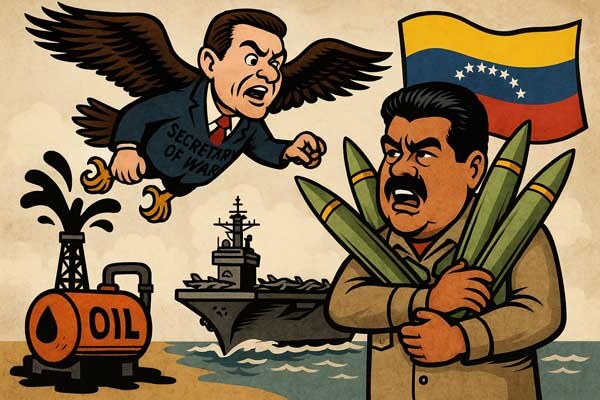 News Staff
News Staff![]() -
November 14, 2025 -
World at War
drugs
Oil down
Defense Secretary Pete Hegseth
Venezuela
Caribbean War
-
507 views -
0 Comments -
0 Likes -
0 Reviews
-
November 14, 2025 -
World at War
drugs
Oil down
Defense Secretary Pete Hegseth
Venezuela
Caribbean War
-
507 views -
0 Comments -
0 Likes -
0 Reviews

Southern Spear and the Secretary of War: America’s Most Serious Joke Yet
Washington – The nation awoke today to the thunderous seriousness of a government that has perfected the art of straight-faced absurdity. With solemn eyebrows and a borrowed Churchillian pose, Defense Secretary Pete Hegseth—who now insists on being called Secretary of War as if auditioning for a reboot of a 1940s newsreel—announced a new military operation against “narco-terrorists” in the Caribbean. The mission name is “Southern Spear,” a title crafted to sound both noble and ominous, while conveniently avoiding the plain truth: Washington is once again sabering the air over Venezuela, a country sitting on the world’s largest proven oil reserves and a government the U.S. has wanted gone longer than anyone cares to admit out loud.

Hegseth made his proclamation on X, posting with the confidence of a man convinced that history books are now written entirely in hashtags. “This mission defends our homeland, eliminates narco-terrorists from our hemisphere, and protects our homeland from drugs that kill our people,” he declared, repeating “homeland” with the enthusiasm of someone testing out a new brand slogan. When asked what the operation actually entails, the Pentagon offered the diplomatic equivalent of a shrug, directing reporters back to Hegseth’s post as if the world’s most powerful military now issues strategy exclusively in 280 characters.
What is known is this: updated strike options have been placed on the President’s desk, including airstrikes and potential land operations inside Venezuela. For now, no final decision has been announced. But the machinery has already moved into place, humming with the unmistakable tone of escalation. The USS Gerald R. Ford, the world’s largest warship and a $13 billion symbol of raw American firepower, now patrols the region with its entourage of destroyers, a nuclear submarine, ninety additional fighter jets, and several thousand service members who likely expected warmer assignments when they enlisted.
This buildup follows months of U.S. drone strikes against suspected drug-smuggling vessels in the Caribbean and Pacific—nearly eighty people dead, twenty-one boats sunk, and a growing chorus of legal scholars questioning whether Hellfire missiles are really the most elegant tool for stopping cocaine shipments. Britain seems to think not, refusing to share intelligence with Washington over concerns the U.S. actions violate international law. Allies, as it turns out, tend to be fond of clarity, something this campaign conspicuously lacks.
Venezuela insists Washington’s motives have nothing to do with narcotics and everything to do with natural resources and political humiliation. It’s hard to dismiss their skepticism entirely. The country possesses more than 300 billion barrels of proven oil—beating Saudi Arabia—and sits atop enormous mineral wealth. Add to that a government Washington openly disdains, led by Nicolás Maduro, a man the U.S. has accused of drug trafficking and slapped with a $50 million reward for his arrest, and the geopolitical math becomes painfully transparent.
Maduro, for his part, has ordered mass mobilization of his forces, boasting of 5,000 Russian-made missiles ready to defend his territory. Yet when a CNN reporter asked if he had a message for the President, he softened: “Please, peace!” It was a reminder that even strongmen can read the room—and recognize when 100,000 tons of American steel are staring back at them.
The irony, of course, hangs over the entire situation like tropical humidity. After a century of drug wars that have accomplished little beyond shifting cartels from one coastline to another, Washington is once again promising a decisive blow. After decades of intervention framed as liberation, stabilization, democracy promotion, and now “narco-terrorist elimination,” the script remains unchanged. And calling the Pentagon’s leader “Secretary of War” doesn’t make the plot any fresher—it just strips away the polite disguise.
This is not satire. This is simply how global power operates when spoken about honestly, without the soft padding of euphemism. Venezuela is unstable, armed, authoritarian, and deeply entangled in the drug trade. It is also oil-rich, strategically positioned, and politically defiant. All of these truths coexist, uncomfortable and intertwined. The United States is acting out of security concerns, political impulses, legal ambiguities, and, undeniably, long-standing interest in who controls the world’s most valuable fossil-fuel vault.
The result is a moment so serious it borders on self-parody. A Secretary of War, a mission called Southern Spear, drones firing Hellfires at fishing vessels, an aircraft carrier casting its shadow over a fragile nation, and two leaders trading warnings while the world’s energy markets quietly take notes.
In other words: business as usual, dressed in louder costumes.

Desert Local News is an invitation-only, members-based publication built on fact-checked, non-biased journalism.
All articles are publicly visible and free to read, but participation is reserved for members—comments and discussion require an invitation to join.
We cover local, state, and world news with clarity and context, free from political agendas, outrage, or misinformation.